1. Life and Education
This section covers Oliver Wendell Holmes Sr.'s formative years, his family background, his diverse academic pursuits including law and medicine, and his early poetic endeavors that brought him national recognition.
1.1. Early Life and Family
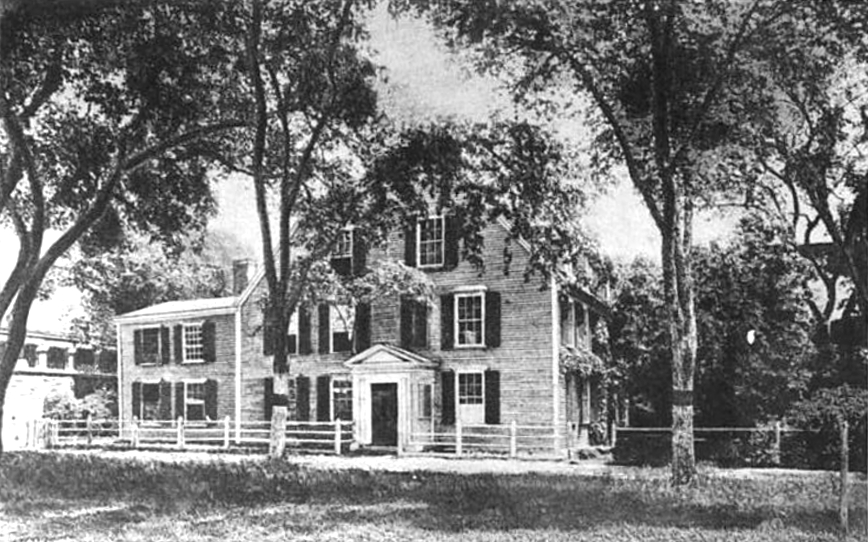
Oliver Wendell Holmes Sr. was born on August 29, 1809, in Cambridge, Massachusetts, in a house located just north of Harvard Yard. This historical site was said to have been the planning location for the Battle of Bunker Hill. He was the first son of Abiel Holmes (1763-1837), a minister of the First Congregational Church and an enthusiastic historian, and Sarah Wendell, Abiel's second wife. Sarah came from a wealthy family, and Holmes was named after his maternal grandfather, a judge. Through his mother, Holmes was also a descendant of Evert Jansen Wendell, who emigrated from the Netherlands in 1640 and settled in Albany, New York. Furthermore, he was related to Massachusetts Governor Simon Bradstreet and his wife, Anne Bradstreet, who was the first published American poet.
From a young age, Holmes was small in stature and suffered from asthma, but he displayed a precocious intellect. At the age of eight, he led his five-year-old brother, John, to witness the last public hanging in Cambridge's Gallows Lot, an act for which he was later reprimanded by his parents. He found great enjoyment in exploring his father's extensive library, which he later described as "very largely theological, so that I was walled in by solemn folios making the shelves bend under the load of sacred learning." Influenced by poets such as John Dryden, Alexander Pope, and Oliver Goldsmith, the young Holmes began to compose and recite his own verses. His earliest recorded poem, transcribed by his father, was written when he was 13 years old. Despite his natural talent as a student, Holmes was frequently disciplined by his teachers for his talkative demeanor and his habit of reading stories during school hours. He received his early education from Dame Prentiss and William Bigelow before enrolling in the "Port School," a selective private academy in the Cambridgeport settlement. One of his schoolmates there was Margaret Fuller, a future critic and author whose intellectual prowess Holmes greatly admired.
1.2. Education
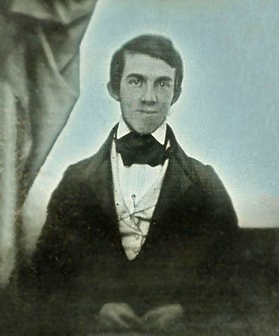
At the age of 15, Oliver Wendell Holmes Sr. was sent by his father to Phillips Academy in Andover, Massachusetts. Abiel Holmes, a minister, chose Phillips for its orthodox Calvinist teachings, hoping his eldest son would follow him into the ministry. However, Holmes had no inclination towards theology and consequently found his single year at Andover unenjoyable. Despite achieving distinction as an elected member of the Social Fraternity, a literary club, he disliked the "bigoted, narrow-minded, uncivilized" attitudes of most of the school's instructors. Nevertheless, one teacher recognized his nascent talent for poetry and encouraged him to pursue it. Shortly after his sixteenth birthday, Holmes was admitted to Harvard College.
As a member of Harvard's class of 1829, Holmes resided at home for the initial years of his college career rather than in the dormitories. Being only 5 feet 3 inches tall even "when standing in a pair of substantial boots," he showed no interest in joining sports teams or the Harvard Washington Corps. Instead, he aligned himself with the "Aristocrats" or "Puffmaniacs," a group of students who gathered to smoke and converse. As a local student and the son of a minister, he was able to navigate between different social circles. He also befriended Charles Chauncy Emerson, the elder brother of Ralph Waldo Emerson. During his second year, Holmes was among 20 students awarded the scholastic honor Deturs, which included a copy of The Poems of James Graham, John Logan, and William Falconer. Despite his academic achievements, he confessed to an Andover schoolmate that he did not "study as hard as I ought to." Nevertheless, he excelled in languages, taking classes in French, Italian, and Spanish.
Holmes's academic interests and hobbies were broadly divided among law, medicine, and writing. He was elected to both the Hasty Pudding Theatricals, where he served as Poet and Secretary, and the Phi Beta Kappa honor society. With two friends, he collaborated on a small book titled Poetical Illustrations of the Athenaeum Gallery of Painting, a collection of satirical poems about a new art gallery in Boston. He was asked to contribute an original work for his graduating class's commencement, for which he wrote a "light and sarcastic" poem that received significant acclaim. Following graduation, Holmes initially intended to pursue a legal career, studying at the Harvard Law School (then known as Dane School) while living at home. However, by January 1830, he became disillusioned with legal studies, writing, "I am sick at heart of this place and almost everything connected to it. I know not what the temple of law may be to those who have entered it, but to me it seems very cold and cheerless about the threshold." This period of discontent soon led him to pivot towards medicine.
1.3. Early Literary Career

The year 1830 proved pivotal for Oliver Wendell Holmes Sr.'s poetic development. Despite his disillusionment with legal studies, he began writing poetry for personal enjoyment. By the end of that year, he had composed over fifty poems, contributing twenty-five of them anonymously to The Collegian, a short-lived publication initiated by his Harvard friends. Among these, four would eventually become some of his most recognized works: "The Dorchester Giant," "Reflections of a Proud Pedestrian," "Evening / By a Tailor," and "The Height of the Ridiculous." Additionally, nine more of his poems were published anonymously in the 1830 pamphlet Illustrations of the Athenaeum Gallery of Paintings.
In September 1830, Holmes read a brief article in the Boston Daily Advertiser detailing the U.S. Navy's plans to dismantle the 18th-century frigate USS Constitution. Deeply moved by this news, Holmes penned "Old Ironsides" in opposition to the ship's scrapping. This patriotic poem was published in the Advertiser the very next day and quickly reprinted by newspapers in New York City, Philadelphia, and Washington, D.C.. It not only brought the author immediate national attention but also generated such widespread public sentiment that the historic ship was ultimately preserved, though some plans for its preservation may have already been underway.
During the remainder of 1830, Holmes published only five more poems. His last significant poem that year was "The Last Leaf," partly inspired by a local figure named Thomas Melvill, who was known as "the last of the cocked hats" and one of the participants in the 1774 Boston Tea Party. Holmes later wrote that Melvill reminded him of "a withered leaf which has held to its stem through the storms of autumn and winter, and finds itself still clinging to its bough while the new growths of spring are bursting their buds and spreading their foliage all around it." The esteemed literary critic Edgar Allan Poe lauded the poem as one of the finest works in the English language. Years later, Abraham Lincoln also became an admirer of the poem; his law partner and biographer, William Herndon, noted in 1867 that he had "heard Lincoln recite it, praise it, laud it, and swear by it." Holmes also contributed to The Token annual gift book in 1831, 1833, and 1837.
Despite his early literary success, Holmes did not initially consider pursuing a professional literary career. He later reflected on "the intoxicating pleasure of authorship," yet paradoxically compared such contentment to a sickness, stating: "there is no form of lead-poisoning which more rapidly and thoroughly pervades the blood and bones and marrow than that which reaches the young author through mental contact with type metal."
2. Medical Career
This section details Oliver Wendell Holmes Sr.'s professional life as a physician, highlighting his advanced training in Paris, his pivotal advocacy for medical reform, his groundbreaking research on childbed fever, and his impactful role as an educator and public health advocate.
2.1. Medical Training and Reform
Having abandoned his law studies, Oliver Wendell Holmes Sr. transitioned to medicine. In the autumn of 1830, he left his childhood home in Cambridge and moved into a boardinghouse in Boston to attend the city's medical college. At that time, medical education was structured around five core subjects: medicine, anatomy and surgery, obstetrics, chemistry, and materia medica. Holmes became a student of James Jackson, a respected physician and the father of a friend, and concurrently worked part-time as a chemist in the hospital dispensary. He was deeply disturbed by the "painful and repulsive aspects" of the prevalent primitive medical treatments of the era, which included practices such as bloodletting and blistering. In contrast, he responded favorably to his mentor's teachings, which emphasized meticulous observation of the patient and more humane approaches to care. Despite his demanding schedule, Holmes managed to continue writing, producing two essays during this period that depicted life from the perspective of his boardinghouse's breakfast table. These essays, which would later evolve into one of his most popular works, were published in November 1831 and February 1832 in The New-England Magazine under the title "The Autocrat of the Breakfast-Table."
In 1833, Holmes traveled to Paris to further his medical education. The city's recently reorganized hospital system offered highly advanced medical training for the time. At 23 years old, Holmes was among the first Americans to be trained in the innovative "clinical" method being developed at the renowned École de Médecine. As lectures were conducted entirely in French, he engaged a private language tutor. Despite being far from home, he maintained strong connections with his family and friends through letters and visits from acquaintances like Ralph Waldo Emerson. He rapidly adapted to his new surroundings, writing to his father, "I love to talk French, to eat French, to drink French every now and then."
At the hospital of La Pitié, he studied under the internal pathologist Pierre Charles Alexandre Louis, whose research demonstrated the ineffectiveness of bloodletting, a practice that had been a cornerstone of medical treatment since antiquity. Louis was a proponent of the méthode expectante, a therapeutic doctrine positing that a physician's role is to assist nature in the disease recovery process and avoid hindering it. Upon his return to Boston, Holmes became one of the foremost advocates in the United States for the méthode expectante. He was awarded his Doctor of Medicine degree from Harvard University in 1836, having written his dissertation on acute pericarditis. While his first collection of poetry was published later that year, Holmes, keen to embark on his medical career, dismissed it as a singular event. In the book's introduction, he mused: "Already engaged in other duties, it has been with some effort that I have found time to adjust my own mantle; and I now willingly retire to more quiet labors, which, if less exciting, are more certain to be acknowledged as useful and received with gratitude."
After his graduation, Holmes quickly became a notable figure in the local medical community, joining the Massachusetts Medical Society, the Boston Medical Society, and the Boston Society for Medical Improvement-an organization comprising young, Paris-trained doctors. His reputation grew further after he won Harvard Medical School's prestigious Boylston Prize for a paper on the benefits of using the stethoscope, a device then unfamiliar to many American doctors. In 1837, Holmes was appointed to the Boston Dispensary, where he was appalled by the poor hygienic conditions. That same year, he competed for and won both Boylston essay prizes.
Desiring to concentrate on research and teaching, he co-founded the Tremont Medical School-which later merged with Harvard Medical School-with three peers, situated above an apothecary shop at 35 Tremont Row in Boston. There, he lectured on pathology, instructed on the use of microscopes, and oversaw the dissection of cadavers. He frequently criticized traditional medical practices, once humorously remarking that if all contemporary medicine were discarded into the sea, "it would be all the better for mankind-and all the worse for the fishes." For the next decade, he maintained a small and inconsistent private medical practice, but dedicated most of his time to teaching. He served on the faculty of Dartmouth Medical School from 1838 to 1840, holding the position of professor of anatomy and physiology. During these years, he traveled to Hanover, New Hampshire, for fourteen weeks each fall to deliver lectures. In 1838, he was elected a Fellow of the American Academy of Arts and Sciences.
Following his resignation from Dartmouth, Holmes delivered a series of three lectures aimed at exposing medical fallacies, or "quackeries." Adopting a more serious tone, he meticulously revealed the flawed reasoning and misrepresentation of evidence common in subjects such as "Astrology and Alchemy" (his first lecture) and "Medical Delusions of the Past" (his second). He strongly denounced homeopathy, the topic of his third lecture, calling it "the pretended science" that was "a mingled mass of perverse ingenuity, of tinsel erudition, of imbecile credulity, and of artful misrepresentation, too often mingled in practice." In 1842, he further solidified his stance by publishing the essay "Homeopathy and Its Kindred Delusions", which again condemned the practice.
In 1846, Holmes notably coined the word anesthesia. In a letter to dentist William T. G. Morton, the first practitioner to publicly demonstrate the use of ether during surgery, Holmes suggested the term: "Everybody wants to have a hand in a great discovery. All I will do is to give a hint or two as to names-or the name-to be applied to the state produced and the agent. The state should, I think, be called 'Anaesthesia.' This signifies insensibility-more particularly...to objects of touch." Holmes accurately predicted that his newly coined term "will be repeated by the tongues of every civilized race of mankind."
2.2. Study of Childbed Fever
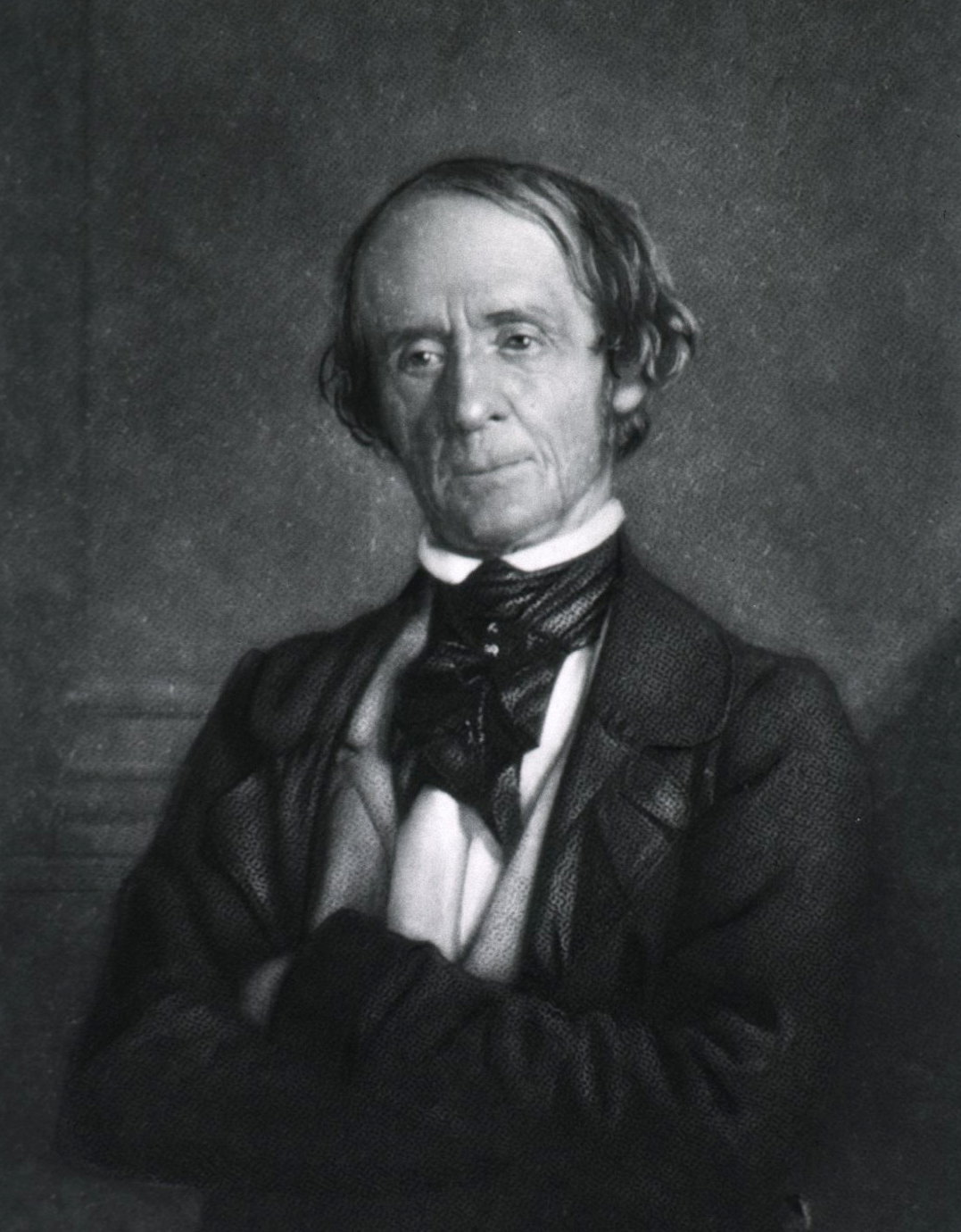
In 1842, Oliver Wendell Holmes Sr. attended a lecture by Walter Channing at the Boston Society for Medical Improvement, which addressed puerperal fever, commonly known as "childbed fever." This disease was, at the time, a significant cause of mortality among women after childbirth. Becoming deeply interested in the subject, Holmes dedicated a year to meticulously reviewing case reports and other medical literature to determine the cause and potential prevention of the condition. In 1843, he presented his findings to the society, subsequently publishing his research as the paper "The Contagiousness of Puerperal Fever" in the short-lived New England Quarterly Journal of Medicine and Surgery.
In this groundbreaking essay, Holmes argued-contrary to the prevailing belief of the time, which predated the widespread acceptance of the germ theory of disease-that puerperal fever, a deadly infection contracted by women during or shortly after childbirth, stemmed from patient-to-patient contact facilitated by their physicians. He specifically highlighted bed sheets, washcloths, and articles of clothing as particularly concerning vectors for transmission. Holmes amassed a substantial body of evidence to support his theory, including accounts of doctors who had fallen ill and died after performing autopsies on patients similarly infected. In concluding his argument, he asserted that any physician whose practice had experienced even a single case of puerperal fever had a moral obligation to thoroughly purify their instruments, incinerate the clothing worn while assisting in the fatal delivery, and abstain from obstetric practice for a period of at least six months.
Despite its initial publication largely escaping widespread notice, Holmes's theory eventually drew strong criticism from two distinguished professors of obstetrics, Hugh L. Hodge and Charles Delucena Meigs, who vehemently denied his contagion theory. Meigs, in particular, famously asserted that doctors were gentlemen, and "gentlemen's hands are clean." In 1855, Holmes published a revised version of his essay as a pamphlet, retitled Puerperal Fever as a Private Pestilence, which included additional case studies. In a new introduction, directly addressing his detractors, Holmes powerfully wrote: "I had rather rescue one mother from being poisoned by her attendant, than claim to have saved forty out of fifty patients to whom I had carried the disease." He further pleaded, "I beg to be heard in behalf of the women whose lives are at stake, until some stronger voice shall plead for them."
A few years later, Ignaz Semmelweis independently arrived at similar conclusions in Vienna. His implementation of prophylaxis, specifically handwashing with a chlorine solution before assisting at delivery, dramatically reduced the puerperal mortality rate. Holmes's then-controversial work is now regarded as a landmark contribution to the understanding and development of the germ theory of disease.
2.3. Teaching and Lecturing
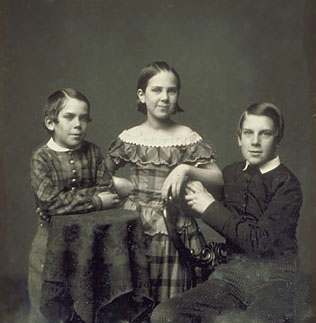
In 1847, Oliver Wendell Holmes Sr. was appointed Parkman Professor of Anatomy and Physiology at Harvard Medical School, a position he held until his retirement in 1882. He also served as dean of the medical school until 1853. Shortly after his appointment, Holmes faced criticism from the all-male student body for considering the admission of a woman named Harriot Kezia Hunt. Due to strong opposition not only from students but also from university overseers and other faculty members, she was ultimately asked to withdraw her application. Harvard Medical School would not admit a woman until 1945, nearly a century later.
Holmes's advanced medical training in Paris profoundly influenced his teaching philosophy. He emphasized to his students the critical importance of the anatomico-pathological basis of disease, asserting that "no doctrine of prayer or special providence is to be his excuse for not looking straight at secondary causes." His students held him in high regard, affectionately referring to him as "Uncle Oliver." One teaching assistant vividly recalled his classroom presence: "He enters [the classroom] and is greeted by a mighty shout and stamp of applause. Then silence, and there begins a charming hour of description, analysis, anecdote, harmless pun, which clothes the dry bones with poetic imagery, enlivens a hard and fatiguing day with humor, and brightens to the tired listener the details for difficult though interesting study."
3. Literary Career
Oliver Wendell Holmes Sr.'s literary career was marked by significant contributions to American literature as both a celebrated poet and a distinctive prose writer. This section explores his unique conversational style, the diverse themes he explored, and his lasting cultural impact as a leading intellectual figure.
3.1. Poetry
Oliver Wendell Holmes Sr. is recognized as one of the prominent Fireside Poets, a group that also included William Cullen Bryant, Henry Wadsworth Longfellow, James Russell Lowell, and John Greenleaf Whittier. These poets were celebrated for their family-friendly and conventional writing, and they were among the first American authors to achieve substantial popularity in Europe. Holmes believed that poetry possessed "the power of transfiguring the experiences and shows of life into an aspect which comes from the imagination and kindles that of others."
Due to his immense popularity during his lifetime, Holmes was frequently commissioned to produce occasional poetry-commemorative verses specifically written for events such as memorials, anniversaries, and birthdays. Referring to this constant demand, he once quipped that he was "a florist in verse, and what would people say / If I came to a banquet without my bouquet?" While critic Hyatt Waggoner observed that "very little... survives the occasions that produced it," Holmes became known as a poet who eloquently expressed the values of loyalty and trust at serious gatherings, and who demonstrated sharp wit at festivities and celebrations. For instance, Edwin Percy Whipple considered Holmes "a poet of sentiment and passion," suggesting that those who knew him only as a comic lyricist would be surprised by the "clear sweetness and skylark thrill of his serious and sentimental compositions."
Beyond the commemorative nature of much of his work, some of Holmes's poems were rooted in his keen observations of the world around him. This is evident in two of his most critically successful and enduring poems-"Old Ironsides" and "The Last Leaf"-both published during his young adulthood. As seen in works such as "The Chambered Nautilus" and "The Deacon's Masterpiece or The Wonderful One-Hoss Shay," Holmes masterfully focused his verse on concrete objects with which he had long familiarity or had studied extensively, such as a one-horse shay or a seashell. Some of his compositions also delve into his personal or family history; for example, the poem "Dorothy Q" presents a tender portrait of his maternal great-grandmother, combining pride, humor, and affection in concise rhyming couplets:
:O Damsel Dorothy! Dorothy Q.!
:Strange is the gift that I owe to you;
:Such a gift as never a king
:Save to daughter or son might bring,-
:All my tenure of heart and hand,
:All my title to house and land;
:Mother and sister and child and wife
:And joy and sorrow and death and life!
Though an outspoken critic of overly sentimental Transcendentalist and Romantic poetry, Holmes occasionally allowed sentimentality to permeate his occasional verse, but he frequently balanced such emotional excess with humor. Critic George Warren Arms characterized Holmes's poetry as provincial, citing his "New England homeliness" and "Puritan familiarity with household detail" as evidence. In his verse, Holmes often interwoven themes of nature with human relations and social lessons; poems like "The Ploughman" and "The New Eden," written to commemorate Pittsfield's scenic countryside, were even quoted in the 1863 edition of the Old Farmer's Almanac. He also composed several hymn texts, including "Thou Gracious God, Whose Mercy Lends" and "Lord of All Being, Throned Afar".
3.2. Prose and Novels
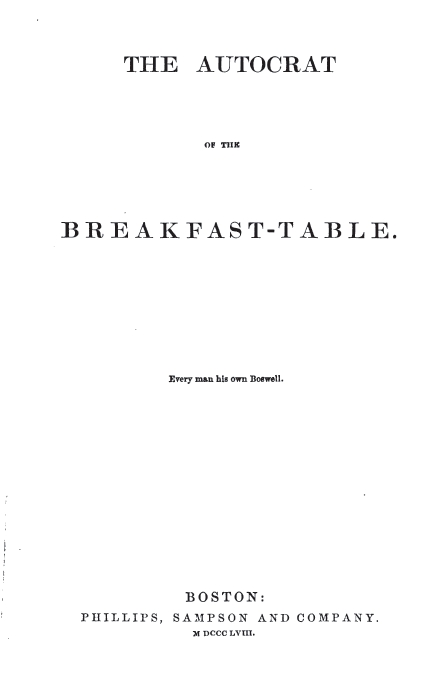
Although primarily known as a poet, Oliver Wendell Holmes Sr. authored numerous medical treatises, essays, novels, memoirs, and table-talk books. His prose works encompassed a wide array of topics, ranging from medicine and theology to psychology, society, democracy, sex and gender, and the natural world. Author and critic William Dean Howells posited that Holmes originated a genre he termed the "dramatized (or discursive) essay," in which the story's plot serves to inform its major themes. Indeed, his works frequently employ a combination of genres, seamlessly integrating excerpts of poetry, essays, and conversations throughout his prose. Critic William Lawrence Schroeder described Holmes's prose style as "attractive" because it "made no great demand on the attention of the reader." However, while he found the author's earlier works, The Autocrat of the Breakfast-Table and The Professor at the Breakfast-Table, to be "virile and fascinating," he noted that later works such as Our Hundred Days in Europe and Over the Teacups "have little distinction of style to recommend them."
Holmes first achieved international recognition with his "Breakfast-Tables" series. These three table-talk books garnered a diverse readership due to their distinctive conversational style, which fostered an intimate connection between the readers and the author, leading to an influx of letters from admirers. The series' conversational tone not only emulates the philosophical debates and pleasantries that occur around a breakfast table but also serves to encourage an openness of thought and expression. In the first volume, the Autocrat asserts: "This business of conversation is a very serious matter. There are men that it weakens one to talk with an hour more than a day's fasting would do. Mark this that I am going to say, for it is as good as a working professional man's advice, and costs you nothing: It is better to lose a pint of blood from your veins than to have a nerve tapped. Nobody measures your nervous force as it runs away, nor bandages your brain and marrow after the operation." The various speakers in the series represent different facets of Holmes's own life and experiences. For example, the speaker of the first installment is understood to be a doctor who spent several years studying in Paris, while the second volume, The Professor at the Breakfast-Table, is narrated from the perspective of a distinguished medical school professor. Although the speakers engage in discussions on countless topics, the flow of conversation invariably guides towards supporting Holmes's Paris-taught conception of science and medicine and their profound relation to morality and the human mind. The Autocrat specifically delves into philosophical issues such as the nature of the self, language, life, and truth.
Holmes's first novel, Elsie Venner, began its serialization in The Atlantic in December 1859. Initially titled "The Professor's Story," the novel centers on a neurotic young woman whose personality is depicted as half-woman, half-snake, a consequence of her mother being bitten by a rattlesnake while pregnant. The novel provoked a wide range of reactions, receiving praise from John Greenleaf Whittier but condemnation from church publications that branded the work as heretical. In the second preface to Elsie Venner, Holmes stated that his purpose in writing the work was "to test the doctrine of 'original sin' and human responsibility for the distorted violation coming under that technical denomination." He also expressed his belief that "a grave scientific doctrine may be detected lying beneath some of the delineations of character" throughout all fiction. Characterizing the work as a "psychological romance," he utilized a romantic narrative to explore moral theology from a scientific perspective.
Holmes referred to his novels as "medicated novels." Some critics consider these works innovative for their early exploration of theories akin to those later developed by Sigmund Freud and other emerging psychiatrists and psychologists. For instance, The Guardian Angel delves into themes of mental health and repressed memory; Holmes consistently integrated the concept of the unconscious mind throughout his works. A Mortal Antipathy features a character whose phobias are rooted in psychic trauma, which is subsequently cured by a form of shock therapy. Despite their thematic depth, Holmes's novels were not critically successful during his lifetime. Psychiatrist Clarence P. Oberndorf, author of The Psychiatric Novels of Oliver Wendell Holmes, candidly stated that the three works are "poor fiction when judged by modern criteria.... Their plots are simple, almost juvenile and, in two of them, the reader is not disappointed in the customary thwarting of the villain and the coming of true love to its own."
4. Personal Life
This section offers insights into Oliver Wendell Holmes Sr.'s private life, encompassing his family relationships, his social engagements within Boston's intellectual circles, and his personal interests beyond his professional and literary pursuits.
4.1. Marriage and Family
On June 15, 1840, Oliver Wendell Holmes Sr. married Amelia Lee Jackson at King's Chapel in Boston. Amelia was the daughter of the Honorable Charles Jackson, formerly an Associate Justice of the Massachusetts Supreme Judicial Court, and the niece of James Jackson, the physician under whom Holmes had studied. Judge Jackson gifted the couple a house at 8 Montgomery Place, which served as their home for eighteen years. They had three children: Oliver Wendell Holmes Jr. (1841-1935), who would become a distinguished Civil War officer and American jurist; Amelia Jackson Holmes (1843-1889); and Edward Jackson Holmes (1846-1884).
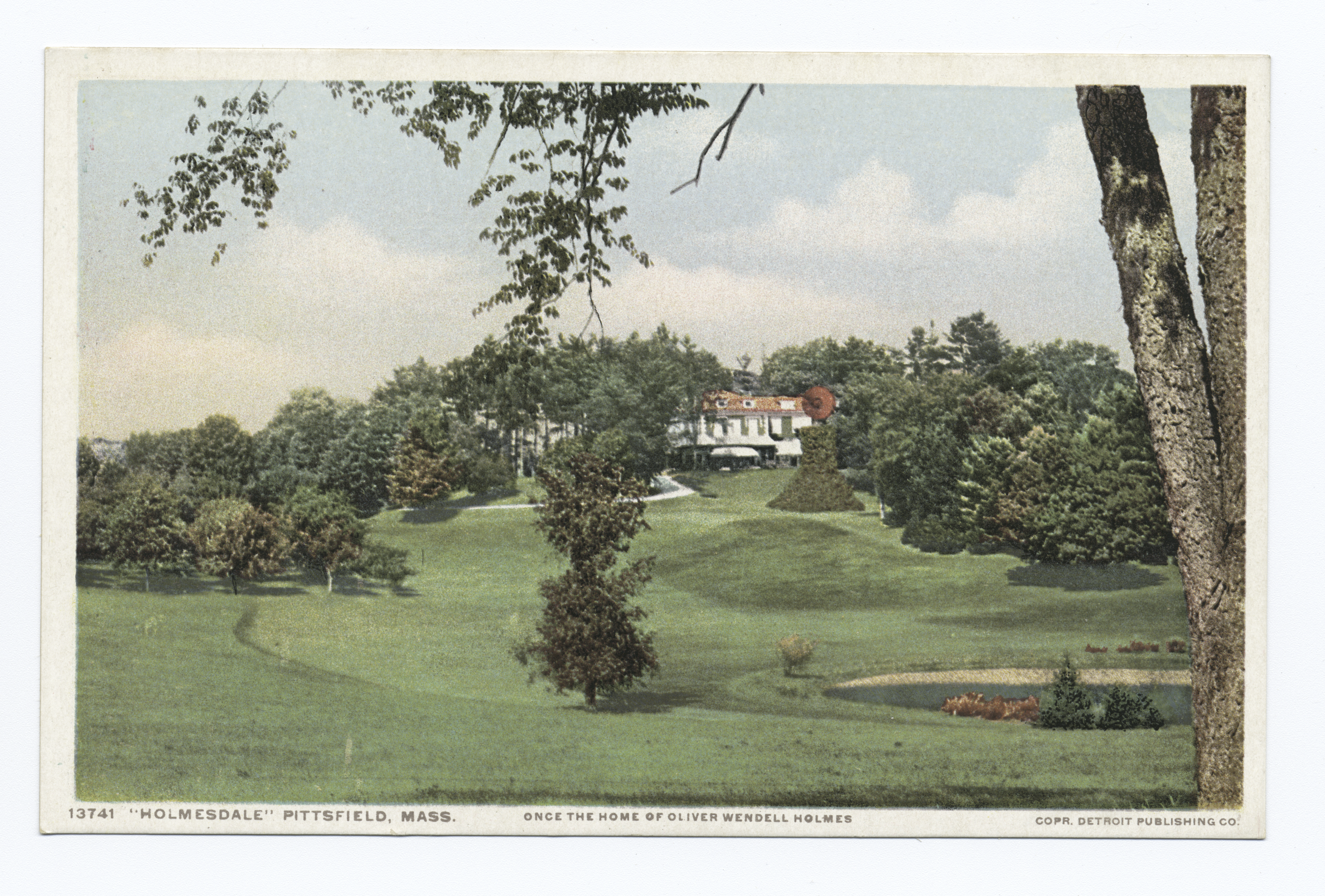
In 1848, Amelia Holmes inherited 2.00 K USD, which she and her husband used to construct a summer house in Pittsfield, Massachusetts. Starting in July 1849, the family enjoyed "seven blessed summers" there. Having recently discontinued his private medical practice, Holmes was able to engage socially with other literary figures who frequented The Berkshires. For instance, in August 1850, Holmes spent time with notable individuals such as Evert Augustus Duyckinck, Cornelius Mathews, Herman Melville, James T. Fields, and Nathaniel Hawthorne. Holmes took pleasure in measuring the circumference of trees on his property and meticulously recorded the data, writing that he had "a most intense, passionate fondness for trees in general, and have had several romantic attachments to certain trees in particular." However, the significant cost associated with maintaining their Pittsfield home led the Holmes family to sell it in May 1856.
5. Later Years and Death
This section chronicles Oliver Wendell Holmes Sr.'s life after his retirement from Harvard, including his extensive European travels, his reflections on personal loss and the effects of aging, and the circumstances surrounding his peaceful death in 1894.
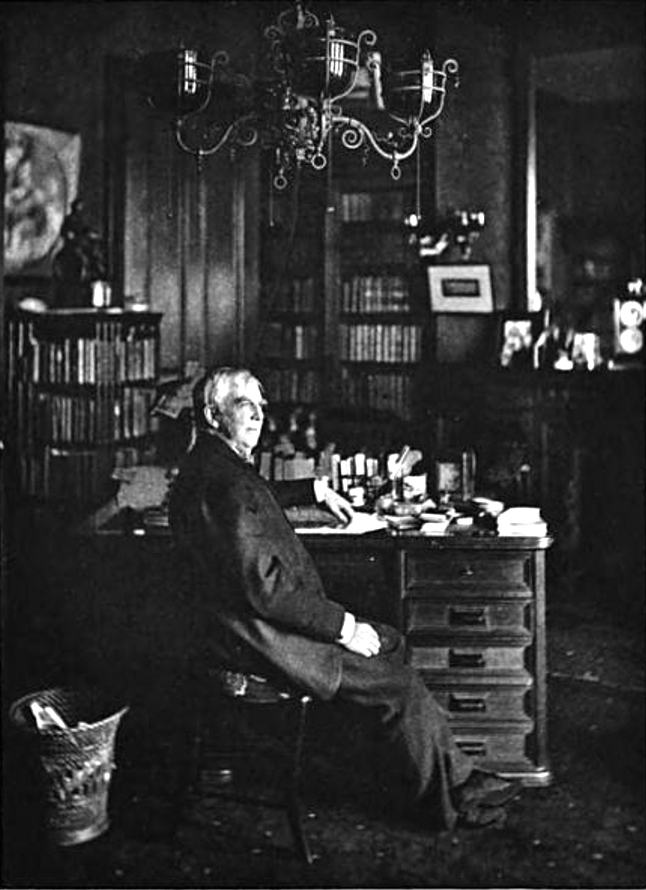
Oliver Wendell Holmes Sr.'s fame continued to grow in his later years. His work The Poet at the Breakfast-Table was published in 1872. Written fifteen years after The Autocrat, this later work adopted a mellower and more nostalgic tone. Holmes reflected on aging, writing: "As people grow older, they come at length to live so much in memory that they often think with a kind of pleasure of losing their dearest possessions. Nothing can be so perfect while we possess it as it will seem when remembered." In 1876, at the age of 70, he published a biography of John Lothrop Motley, an expansion of an earlier sketch he had written for the Massachusetts Historical Society Proceedings. The following year, he released a collection of his medical essays and Pages from an Old Volume of Life, which compiled various essays he had previously written for The Atlantic Monthly. In 1880, he was elected a member of the American Philosophical Society. Holmes retired from Harvard Medical School in 1882, concluding a distinguished 35-year tenure as a professor. After delivering his final lecture on November 28, the university conferred upon him the title of professor emeritus.
In 1884, Holmes published a book dedicated to the life and works of his close friend, Ralph Waldo Emerson. Subsequent biographers frequently used Holmes's book as a foundational outline for their own studies, particularly valuing the section devoted to Emerson's poetry, into which Holmes offered unique insights. Beginning in January 1885, Holmes's third and final novel, A Mortal Antipathy, was serialized in The Atlantic Monthly. Later that year, despite his disapproval of his poetry, Holmes contributed 10 USD to Walt Whitman and persuaded his friend John Greenleaf Whittier to do the same. This gesture came after a lawyer friend of Whitman, Thomas Donaldson, requested monetary donations for a horse and buggy for Whitman, who was becoming increasingly reclusive in his old age.
Exhausted and grieving the sudden death of his youngest son, Holmes began to postpone his writing and social engagements. In late 1884, he embarked on a visit to Europe with his daughter, Amelia. During his time in Great Britain, he met with renowned writers such as Henry James, George du Maurier, and Alfred Tennyson. He was also awarded honorary degrees, including a Doctor of Letters from the University of Cambridge, a Doctor of Laws from the University of Edinburgh, and a third honorary degree from the University of Oxford. Following his visit to Britain, Holmes and Amelia traveled to Paris, a city that had profoundly influenced him in his earlier years. There, he met the celebrated chemist and microbiologist Louis Pasteur, whose pioneering studies in germ theory had significantly contributed to reducing the mortality rate of women afflicted with puerperal fever. Holmes lauded Pasteur as "one of the truest benefactors of his race." Upon his return to the United States, Holmes published a travelogue detailing his experiences, titled Our One Hundred Days in Europe.
In June 1886, Holmes received an honorary degree from Yale University Law School. His wife of over forty years, Amelia, who had struggled with an illness that left her an invalid for several months, passed away on February 6, 1888. The younger Amelia died the following year after a brief illness. Despite his weakening eyesight and a growing fear of becoming antiquated, Holmes continued to find solace in writing. He published Over the Teacups, the final installment of his popular table-talk books, in 1891.
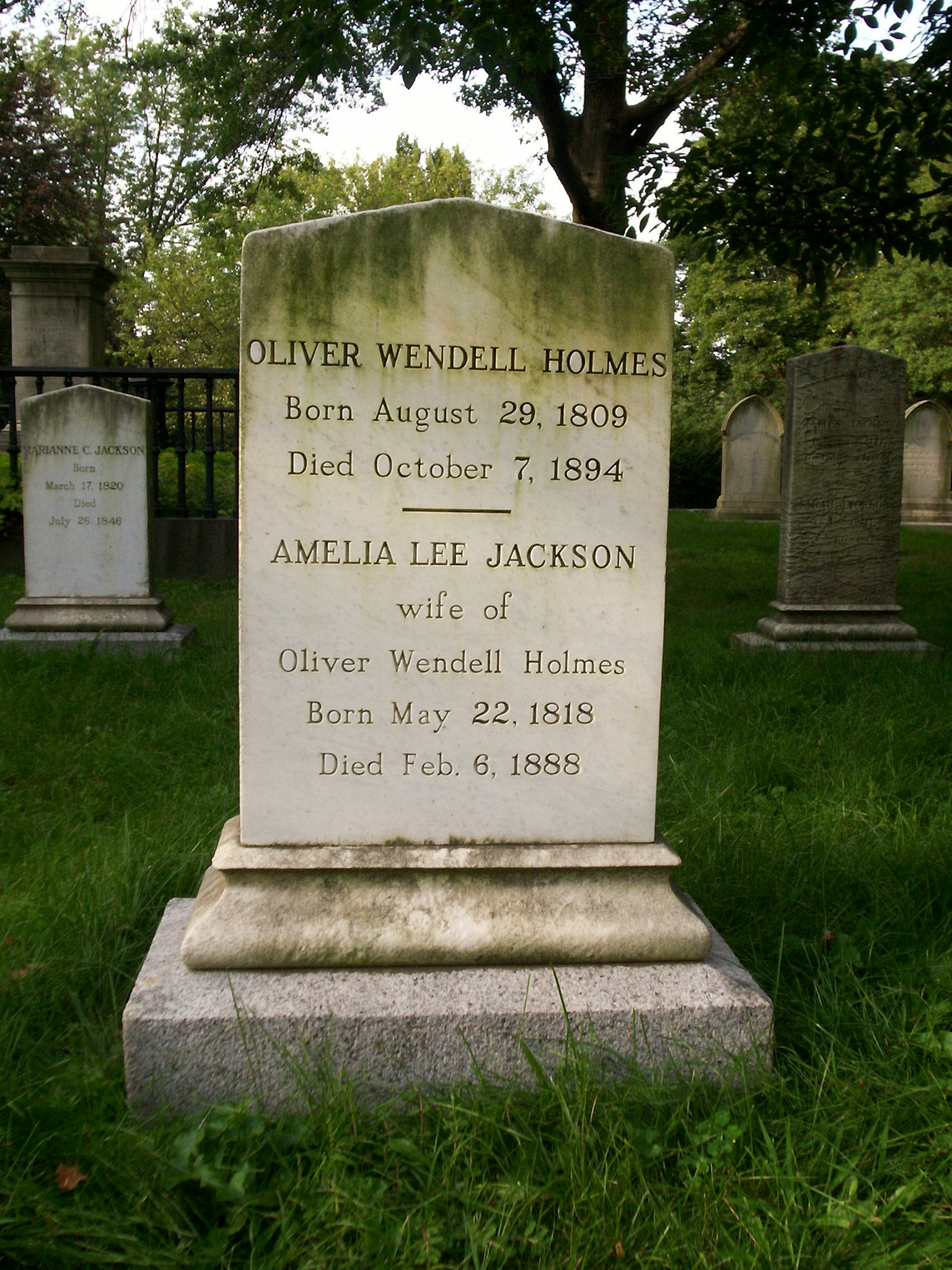
Towards the end of his life, Holmes reflected on having outlived most of his closest friends, including Ralph Waldo Emerson, Henry Wadsworth Longfellow, James Russell Lowell, and Nathaniel Hawthorne. He expressed this sentiment by saying, "I feel like my own survivor... We were on deck together as we began the voyage of life... Then the craft which held us began going to pieces." His last public appearance was at a reception for the National Education Association in Boston on February 23, 1893, where he presented the poem "To the Teachers of America." A month later, Holmes wrote to Harvard president Charles William Eliot, suggesting that the university consider adopting the honorary doctor of letters degree and offer one to Samuel Francis Smith, though such a degree was never issued.
Oliver Wendell Holmes Sr. died peacefully on the afternoon of Sunday, October 7, 1894, after falling asleep. As his son, Oliver Wendell Holmes Jr., wrote, "His death was as peaceful as one could wish for those one loves. He simply ceased to breathe." His memorial service was held at King's Chapel in Boston and was overseen by Edward Everett Hale. Holmes was buried alongside his wife in Mount Auburn Cemetery in Cambridge, Massachusetts.
6. Legacy and Criticism
This section evaluates Oliver Wendell Holmes Sr.'s enduring impact on American culture, literature, and medicine, while also critically examining the controversies surrounding his social views and intellectual contributions that reflect the complex social and political dynamics of his era.
6.1. Literary and Medical Legacy
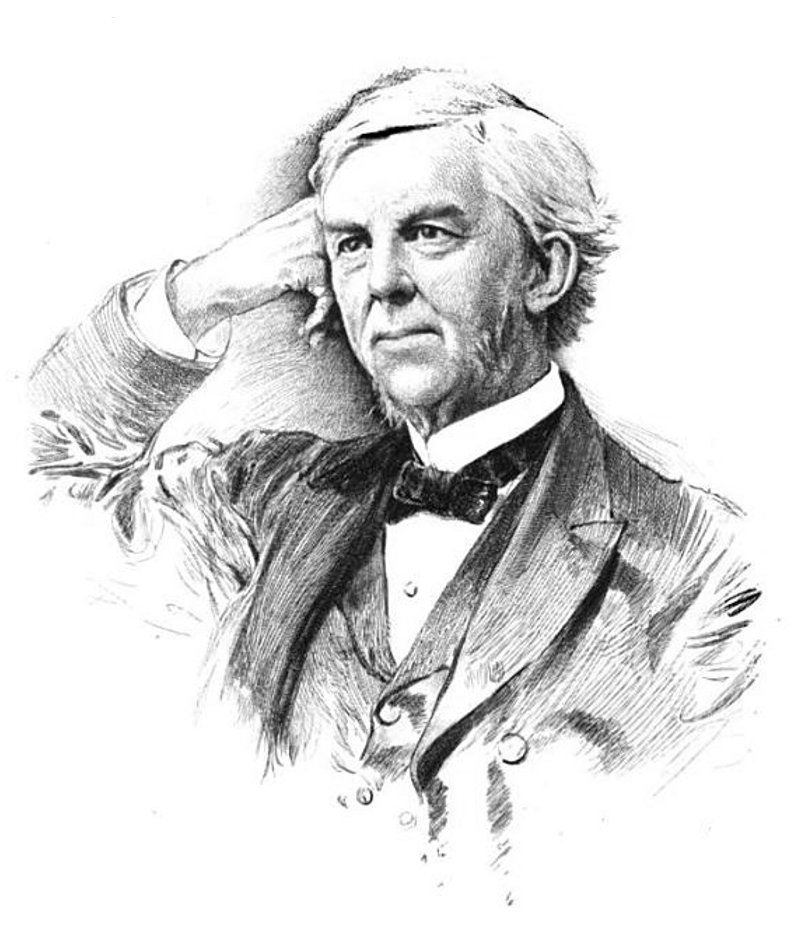
Oliver Wendell Holmes Sr. commanded great respect from his contemporaries and garnered a substantial, international following throughout his long life. He was particularly celebrated for his intellect; American theologian Henry James Sr. famously called him "intellectually the most alive man I ever knew." Critic John G. Palfrey also lauded Holmes as "a man of genius... His manner is entirely his own, manly and unaffected; generally easy and playful, and sinking at times into 'a most humorous sadness'." However, critics S. I. Hayakawa and Howard Mumford Jones presented a more nuanced view, arguing that Holmes was "distinctly an amateur in letters. His literary writings, on the whole, are partly the leisure-born meditations of a physician, partly a means of spreading certain items of professional propaganda, partly a distillation of his social life." Much like Samuel Johnson in 18th-century England, Holmes was renowned for his conversational prowess, both in his personal life and his literary output. Though nationally popular, Holmes was a fervent promoter of Boston culture, confidently asserting that the city was "the thinking centre of the continent, and therefore of the planet." He is widely associated with and is credited with coining the term "Boston Brahmin", which he used to refer to the oldest and most intellectually distinguished families in the Boston area. He also famously dubbed Emerson's seminal work The American Scholar the American "intellectual Declaration of Independence."
Holmes's essay on puerperal fever has been widely regarded as "the most important contribution made in America to the advancement of medicine" up to that time, marking a significant milestone in public health. Despite this crucial medical contribution, Holmes is most broadly celebrated as a humorist and poet. Editor and critic George Ripley, an admirer, hailed him as "one of the wittiest and most original of modern poets." Ralph Waldo Emerson noted that although Holmes did not fully re-focus on poetry until later in his life, he rapidly perfected his craft "like old pear trees which have done nothing for ten years, and at last begin to grow great."
Poems by Holmes, along with those by the other Fireside or "schoolroom" poets, were often mandated for memorization by schoolchildren. Although rote recitation as a learning method began to decline by the 1890s, these poets nevertheless retained their status as ideal New England literary figures. Literary scholar Lawrence Buell observed that these poets, though "value[d] less than the nineteenth century did," are still "regarded as the mainstream of nineteenth-century New England verse." However, some modern scholars contend that many of these poets eventually became recognized primarily as children's poets. A 20th-century scholar notably inquired about Holmes's contemporary Longfellow: "Who, except wretched schoolchildren, now reads Longfellow?" Another contemporary scholar points out that "Holmes is a casualty of the ongoing movement to revise the literary canon. His work is the least likely of the Fireside Poets to find its way into American literature anthologies."
In recognition of his legacy, the school library of Phillips Academy in Andover, Massachusetts, where Holmes studied as a child, is named the Oliver Wendell Holmes Library, or OWHL. This library's Special Collections department houses various items from Holmes's personal library, including medical papers, essays, songs, and poems. In 1915, Bostonians dedicated a memorial bench and sundial behind Holmes's final residence at 296 Beacon Street, thoughtfully placed where he could have viewed it from his library. King's Chapel in Boston, where Holmes was a worshipper, erected an inscribed memorial tablet in his honor. This tablet notably lists Holmes's achievements in the order he himself recognized them: "Teacher of Anatomy, Essayist and Poet." It concludes with a quote from Horace's Ars Poetica: Miscuit Utile Dulci-meaning "He mingled the useful with the pleasant."
6.2. Social Views and Controversies
Oliver Wendell Holmes Sr.'s social views and actions, while reflecting the complexities of 19th-century America, have drawn significant criticism and remain subjects of historical debate.
In 1850, Holmes controversially admitted Martin Delany, an African-American man who had collaborated with Frederick Douglass, to Harvard Medical School. Delany sought admission after being rejected by four other institutions despite his impressive credentials. Holmes's decision, which also included admitting two other black men, ignited a strong reaction from the predominantly white, all-male student body. This led to a student statement resolving: "That we have no objection to the education and evaluation of blacks but do decidedly remonstrate against their presence in College with us." While 60 students signed this resolution, 48 signed a counter-resolution stating it would be "a far greater evil, if, in the present state of public feeling, a medical college in Boston could refuse to this unfortunate class any privileges of education, which it is in the power of the profession to bestow." In response to the backlash, Holmes informed the black students they would not be permitted to continue their studies after that semester. A faculty meeting subsequently directed Holmes to formalize this decision by writing that "the intermixing of races is distasteful to a large portion of the class, & injurious to the interests of the school."
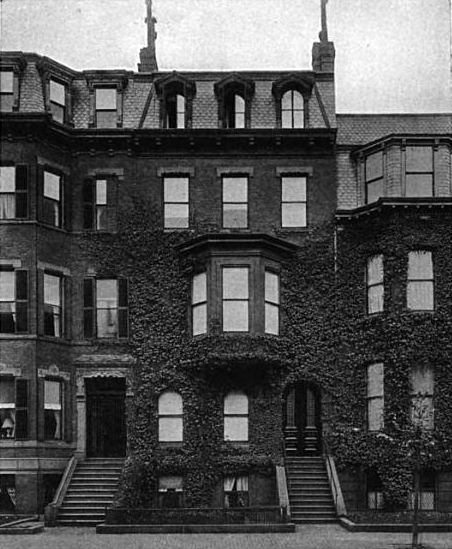
Despite his support for the education of Black individuals, Holmes was not an ardent abolitionist. He opposed what he considered the abolitionists' tendency to use "every form of language calculated to inflame," feeling that the movement was becoming too extreme. This cautious stance dismayed friends such as James Russell Lowell, who once urged Holmes to be more outspoken against slavery. Holmes calmly replied, "Let me try to improve and please my fellowmen after my own fashion at present." Nevertheless, Holmes expressed a belief that slavery could and should be ended peacefully and legally. Following South Carolina's secession from the Union in 1861 and the outbreak of the American Civil War, Holmes began publishing works, such as the patriotic song "A Voice of the Loyal North," in support of the Union cause. While he had previously criticized abolitionists as potentially traitorous, his primary concern during the war was the preservation of the Union. In September of that year, he published "Bread and Newspapers" in The Atlantic, proudly identifying himself as a devoted Unionist. He proclaimed, "War has taught us, as nothing else could, what we can be and are," asserting that it even inspired the upper class to have "courage... big enough for the uniform which hangs so loosely about their slender figures." However, by July 4, 1863, Holmes acknowledged, "how idle it is to look for any other cause than slavery as having any material agency in dividing the country" and explicitly declared it as one of "its sins against a just God." Holmes also experienced the war personally, as his oldest son, Oliver Wendell Holmes Jr., enlisted in the Army against his father's wishes in April 1861 and was wounded three times in battle, including a gunshot wound to the chest at the Battle of Ball's Bluff in October 1861. Holmes later published an account in The Atlantic Monthly detailing his search for his son after hearing of his injury at the Battle of Antietam.
Holmes's views on Native Americans reflected the prejudiced sentiments prevalent in his era. He regarded them as "a sketch in red crayon of a rudimental manhood," and concerning "the problem of his relation to the white race," he saw only one solution: "extermination." Additionally, Holmes expressed strong disapproval of the burgeoning temperance movement. Facing increasing criticism from the press regarding his vocal anti-abolitionism and his disdain for the temperance cause, he eventually chose to discontinue his public lecturing.
In 1850, while serving as dean, Holmes became involved in the sensational Parkman-Webster murder case, appearing as a witness for both the defense and prosecution. The victim, George Parkman, was a local physician and wealthy benefactor, and the assailant, John Webster, was a Harvard graduate and professor of chemistry at the Medical School during the time of the highly publicized murder. Webster was ultimately convicted and hanged. Holmes dedicated his introductory lecture at the Medical School in November 1850 to Parkman's memory.
7. Selected Works
This section lists the significant published works of Oliver Wendell Holmes Sr., categorized by genre, highlighting his prolific and diverse literary and scientific output.
- Poetry**
- Medical and Psychological Studies**
- Table-Talk Books**
- Novels**
- Biographies and Travelogue**
- Selected Articles in The Atlantic Monthly**